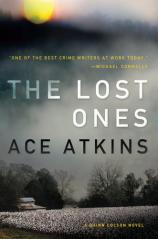The Lost Ones: A Quinn Colson Novel
Review
The Lost Ones: A Quinn Colson Novel
You know how you can download a sample of an eBook, normally the first several pages, to your eReader? I did that with Ace Atkins’ second Quinn Colson novel, even though I had a physical copy of the book. I did that because I usually carry my Kindle with me, and I wanted to show people --- friends, acquaintances, baristas and total strangers --- how good this book is. I read the first paragraph and was immediately transported back to a night when I was five years old and my parents took me and my brother and sister to a carnival in Delaware County, Ohio. When readers gather and argue about what book has the best opening paragraph, they’re going to have to include THE LOST ONES in the discussion. It’s in the same class as James Crumley and James Lee Burke.
"When readers gather and argue about what book has the best opening paragraph, they’re going to have to include THE LOST ONES in the discussion. It’s in the same class as James Crumley and James Lee Burke."
Quinn Colson is a complex character, and Atkins is in no particular hurry to peel off the layers of his personality to reveal what lies beneath. But he does reveal some of the man here, and it’s a dark tale, indeed --- or, perhaps more accurately, a dark tale beneath a darker one. THE LOST ONES is about the day that the war along the U.S.-Mexican border comes to Tibbehah County, Mississippi, and what Colson, a veteran of the Afghanistan conflict, does about it, balancing politics, local crime and corruption, all with a strong but fair hand.
Colson, who gently flawed but extremely likable, almost immediately is confronted with a horrific scene involving a foster home chamber of horrors that is tied with a scheme to run firearms out of Mississippi into Mexico. Making matters worse is that the man behind it all is a friend of Colson’s named Donnie Varner. And speaking of complex characters: Varner is almost as multi-faceted as Colson, an unpolished, erstwhile truck-stop prince who in any given situation is fighting well above his weight class and knows it, but unhesitatingly steps into things and keeps swinging until he goes down for the count.
Atkins creates an extremely subtle parallel between Colson and Varner; both men undergo an experience in very similar ways and manners during the course of the book, but from far different perspectives. And though at odds with each other, they share a common enemy. Additionally, both are well acquainted with violence, as is demonstrated repeatedly throughout the novel, though not in a gratuitous manner. By the story’s conclusion, much is resolved satisfactorily, though enough is left unanswered to leave the reader hungry for the next course.
Atkins --- with far less fanfare than he deserves --- is at the point where his writing is becoming the gold standard of genre and (yes) literary fiction. And strange as it seems, even with novels like WHITE SHADOW, WICKED CITY and THE LOST ONES, I have a gut feeling that he has yet to write his best book. If you are unfamiliar with Atkins, now is the point to jump on. Or ask to see my Kindle. I’ll be happy to stand there and let you take a look at that first paragraph, because you will want to read the rest of the book afterwards.
Reviewed by Joe Hartlaub on June 1, 2012





